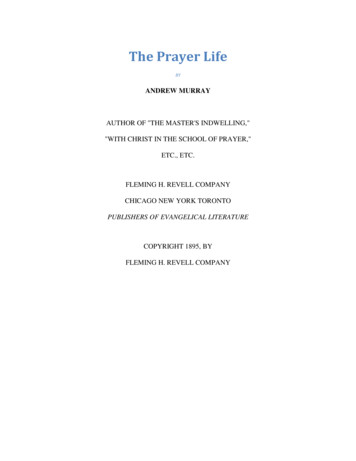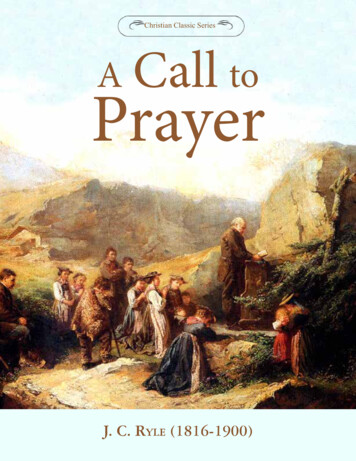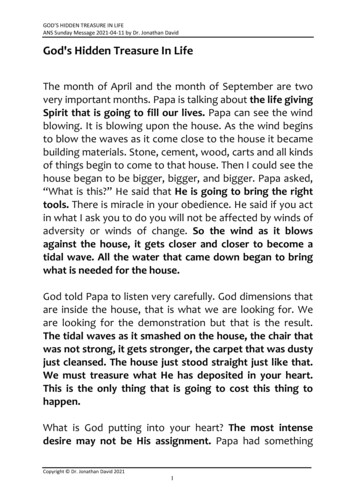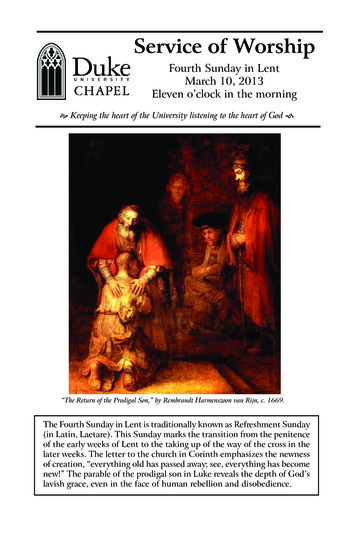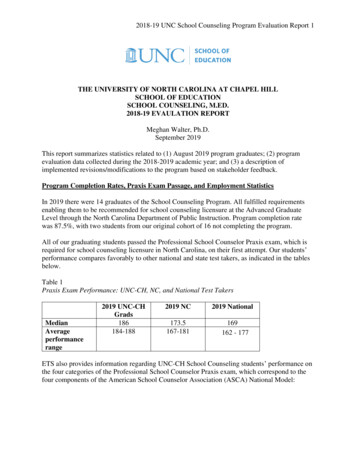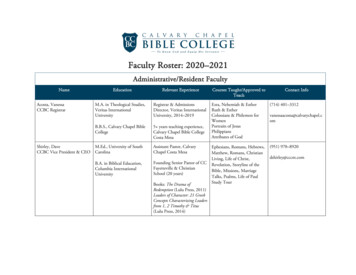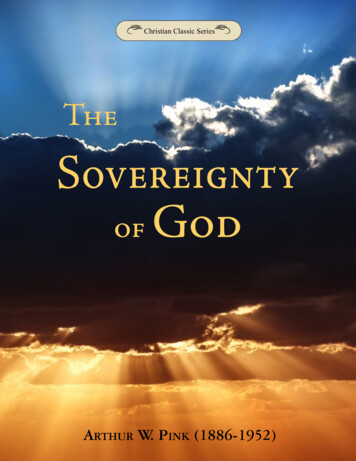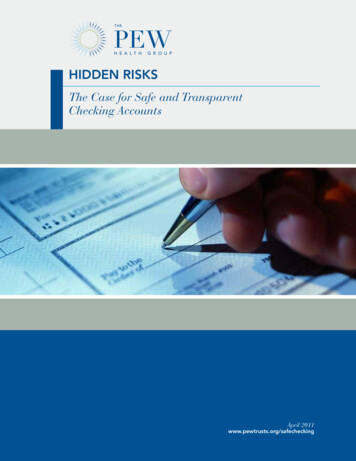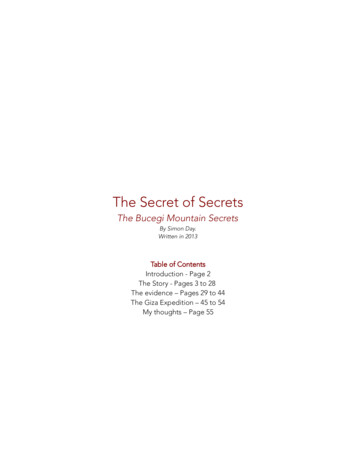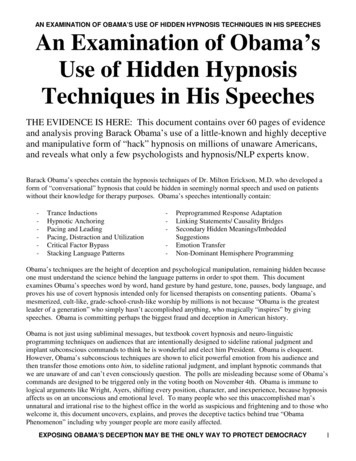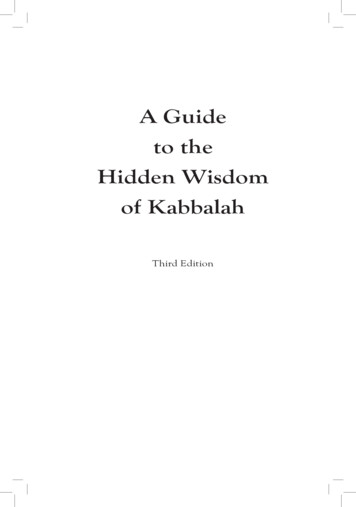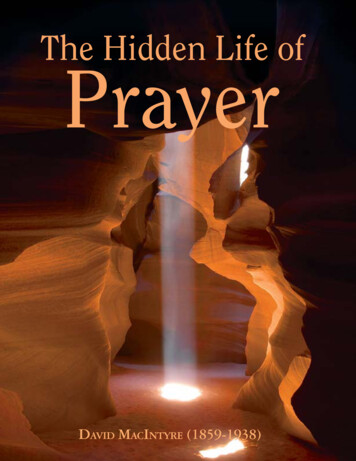
Transcription
The Hidden Life ofPrayerDavid MacIntyre (1859-1938)
THE HIDDENLIFE OF PRAYERContents1.2.3.4.5.6.7.8.The Life of Prayer . 3The Equipment . 8The Direction of the Mind . 13The Engagement: Worship . 18The Engagement: Confession . 23The Engagement: Request . 28The Hidden Riches of the Secret Place. 32The Open Recompense . 36
Some of the archaic words have been changed into modern English, for thepurpose of making this publication easier to read. Copyright 1996 Chapel Library: abridgment, paraphrase, annotations. Printed in theUSA. Chapel Library does not necessarily agree with all the doctrinal views of the authors itpublishes. Permission is expressly granted to reproduce this material by any means,provided1) There is no charge beyond a nominal sum for cost of duplication;2) Copyright notice and all the text on this page are included.Worldwide, please download material without charge from our website, or contact theinternational distributor as listed there for your country.In North America, for additional copies of this booklet or other Christ-centered materialsfrom prior centuries, please contactCHAPEL LIBRARY2603 West Wright StreetPensacola, Florida 32505 USAPhone: (850) 438-6666 - Fax: (850) 438-0227chapel@mountzion.org - www.chapellibrary.orgA study guide is also available. For it or information about other Bible study materials andcorrespondence courses (often based on texts from prior centuries), please contact:Mount Zion Bible Institute2603 West Wright StreetPensacola, Florida 32505Phone: (850) 438-1037school@mountzion.orgMZBI courses may be downloaded worldwide without charge fromwww.mountzion.org2
1. The Life of Prayer“My God. Thy creature answers, Thee.”—Alfred de Musset“The love of Christ is my prayer-book.”—Gerhard Tersteegen“Prayer is the key of heaven; the Spirit helps faith to turn this key.”—Thomas WatsonIntroductionIn one of the cathedrals of Northern Europe an exquisite group in high reliefrepresents the prayer life. It is disposed in three panels. The first of these reminds us ofthe apostolic precept, “Pray without ceasing.” We see the front of a spacious templewhich opens on the market-place. The great square is strewn with crowds of eager men,gesticulating, bargaining—all evidently intent on gain. But One, who wears a circlet ofthorn, and is clothed in a garment woven without seam from the top throughout, movessilently through the clamorous crowds, and subdues to holy fear the most covetousheart.The second panel displays the precincts of the temple, and serves to illustrate thecommon worship of the Church. White-robed ministers hasten here and there. Theycarry oil for the lamp, and water for the laver, and blood from the altar; with pureintention, their eyes turned towards the unseen glory, they fulfill the duties of theirsacred calling.The third panel introduces us to the inner sanctuary. A solitary worshipper hasentered within the veil, and hushed and lowly in the presence of God, bends before theglancing Shekinah. This represents the hidden life of prayer of which the Master spokein the familiar words, “But thou, when thou prayest, enter into thy closet, and whenthou hast shut thy door, pray to thy Father which is in secret; and thy Father whichseeth in secret shall reward thee openly.” (Mat 6:6).Our Lord takes it for granted that His people will pray. And indeed in Scripturegenerally the outward obligation of prayer is implied rather than asserted. Moved by adivinely-implanted instinct, our natures cry out for God, for the living God. And howeverthis instinct may be crushed by sin, it awakes to power in the consciousness ofredemption. Theologians of all schools, and Christians of every type, agree in theirrecognition of this principle of the new life. Chrysostom has said, “The just man does notdesist from praying until he ceases to be just;” and Augustine, “He that loveth littleprayeth little, and he that loveth much prayeth much;” and Richard Hooker, “Prayer isthe first thing wherewith a righteous life beginneth, and the last wherewith it doth end;”and Père la Combe, “He who has a pure heart will never cease to pray, and he who will beconstant in prayer shall know what it is to have a pure heart;” and Bunyan, “If thou artnot a praying person, thou art not a Christian;” and Richard Baxter, “Prayer is the breathof the new creature;” and George Herbert, “Prayer the soul’s blood.”3
Prayer Is Hard WorkAnd yet, instinctive as is our dependence upon God, no duty is more earnestlyimpressed upon us in Scripture than the duty of continual communion with Him. Themain reason for this unceasing insistence is the arduousness of prayer. In its nature it isa laborious undertaking, and in our endeavor to maintain the spirit of prayer we arecalled to wrestle against principalities and powers of darkness.“Dear Christian reader,” says Jacob Boehme, “to pray aright is right earnest work.”Prayer is the most sublime energy of which the spirit of man is capable.1 It is in oneaspect glory and blessedness; in another, it is toil and travail, battle and agony. Upliftedhands grow tremulous long before the field is won; straining sinews and panting breathproclaim the exhaustion of the “heavenly footman.” The weight that falls upon an achingheart fills the brow with anguish, even when the midnight air is chill. Prayer is the upliftof the earth-bound soul into the heaven, the entrance of the purified spirit into theholiest; the rending of the luminous veil that shuts in, as behind curtains, the glory ofGod. It is the vision of things unseen; the recognition of the mind of the Spirit; the effortto frame words which man may not utter. A man that truly prays one prayer,” saysBunyan, “shall after that never be able to express with his mouth or pen the unutterabledesires, sense, affection, and longing that went to God in that prayer.” The saints of theJewish Church had a princely energy in intercession: “Battering the gates of heaven withstorms of prayer,” they took the kingdom of heaven by violence. The first Christiansproved in the wilderness, in the dungeon, in the arena, and at the stake the truth of theirMaster’s words, “He shall have whatsoever he saith.” Their souls ascended to God insupplication as the flame of the altar mounts heavenward. The Talmudists affirm that inthe divine life four things call for fortitude; of these prayer is one. One who metTersteegen at Kronenberg remarked, “It seemed to me as if he had gone straight intoheaven, and had lost himself in God; but often when he had done praying he was aswhite as the wall.” David Brainerd notes that on one occasion, when he found his soul“exceedingly enlarged” in supplication, he was “in such anguish, and pleaded with somuch earnestness and importunity,” that when he rose from his knees he felt “extremelyweak and overcome.” “I could scarcely walk straight,” he goes on to say, “my joints wereloosed, the sweat ran down my face and body, and nature seemed as if it would dissolve.”A living writer has reminded us of John Foster, who used to spend long nights in hischapel, absorbed in spiritual exercises, pacing to and fro in the disquietude of his spirit,until his restless feet had worn a little track in the aisle.2One might easily multiply examples, but there is no need to go beyond Scripture tofind either precept or example to impress us with the arduousness of that prayer whichprevails. Should not the supplication of the Psalmist, “Quicken Thou me, according toThy word quicken me in Thy righteousness quicken me after Thy lovingkindness quicken me according to Thy judgments quicken me, O Lord, for Thyname’s sake;” and the complaint of the Evangelical Prophet, “There is none that callethupon Thy name, that stirreth up himself to take hold of Thee,” find an echo in ourexperience? Do we know what it is to “labor,” to “wrestle,” to “agonize” in prayer?34
Another explanation of the arduousness of prayer lies in the fact that we arespiritually hindered: there is “the noise of archers in the places of drawing water.” St.Paul assures us that we shall have to maintain our prayer energy “against the rulers ofthe darkness of this world, against spiritual wickedness in high places.” Dr. AndrewBonar used to say that, as the King of Syria commanded his captains to fight neitherwith small nor great, but only with the King of Israel, so the prince of the power of theair seems to bend all the force of his attack against the spirit of prayer. If he should provevictorious there, he has won the day.Sometimes we are conscious of a satanic impulse directed immediately against thelife of prayer in our souls. Sometimes we are led into “dry” and wilderness-experiences,and the face of God grows dark above us. Sometimes, when we strive most earnestly tobring every thought and imagination under obedience to Christ, we seem to be givenover to disorder and unrest. Sometimes the inbred slothfulness of our nature lends itselfto the evil one as an instrument by which he may turn our minds back from the exerciseof prayer. Because of all these things, therefore, we must be diligent and resolved,watching as a sentry who remembers that the lives of men are lying at the hazard of hiswakefulness, resourcefulness, and courage.4 “And what I say unto you,” said the Lord toHis disciples, “I say unto all, Watch!”We Must Be on GuardThere are times when even the soldiers of Christ become heedless of their trust, andno longer guard with vigilance the gift of prayer. Should any one who reads these pagesbe conscious of loss of power in intercession, lack of joy in communion, hardness andimpenitence in confession, “Remember from whence thou art fallen, and repent, and dothe first works.”5“Oh, stars of heaven that fade and flame, Oh, whispering waves below!Was earth, or heaven. or I the same, A year, a year ago!The stars have kept their home on high, The waves their wonted flow;The love is lost that once was I, A year, a year ago.”6The only remedy for this sluggish mood is that we should “rekindle our love,” asPolycarp wrote to the Church in Ephesus, “in the blood of God.” Let us ask for a freshgift of the Holy Spirit to quicken our sluggish hearts, a new disclosure of the charity ofGod. The Spirit will help our infirmities, and the very compassion of the Son of God willfall upon us, clothing us with zeal as with a garment, stirring our affections into a mostvehement flame, and filling our souls with heaven.“Men ought always to pray, and”—although faintness of spirit attends on prayer likea shadow—“not faint.” The soil in which the prayer of faith takes root is a life ofunbroken communion with God, a life in which the windows of the soul are always opentowards the City of Rest. We do not know the true potency of prayer until our hearts areso steadfastly inclined to God that our thoughts turn to Him, as by a divine instinct,whenever they are set free from the consideration of earthly things. It has been said ofOrigen (in his own words) that his life was “one unceasing supplication.” By this means5
above all others the perfect idea of the Christian life is realized. Communion between thebeliever and his Lord ought never to be interrupted.7Prayer Is Continuous“The vision of God,” says Bishop Westcott, “makes life a continuous prayer.” And inthat vision all fleeting things resolve themselves, and appear in relation to thingsunseen. In a broad use of the term, prayer is the sum of all the service that we render toGod,8 so that all fulfillment of duty is, in one sense, the performance of divine service,and the familiar saying, “Work is worship,” is justified. “I am prayer,” said a Psalmist(Psa 109:4). “In everything, by prayer and supplication, with thanksgiving,” said anApostle.In the Old Testament that life which is steeped in prayer is often described as a walkwith God. Enoch walked in assurance, Abraham in perfectness, Elijah in fidelity, the sonsof Levi in peace and equity. Or it is spoken of as a dwelling with God, even as Joshuadeparted not from the Tabernacle; or as certain craftsmen of the olden time abode with aking for his work. Again, it is defined as the ascent of the soul into the Sacred Presence;as the planets, “with open face beholding,” climb into the light of the sun’s countenance,or as a flower, lit with beauty and dipped in fragrance, reaches upwards towards thelight. At other times, prayer is said to be the gathering up of all the faculties in an ardorof reverence, and love, and praise. As one clear strain may succeed in reducing toharmony a number of mutually-discordant voices, so the reigning impulses of thespiritual nature unite the heart to fear the name of the Lord.But the most familiar, and perhaps the most impressive, description of prayer in theOld Testament, is found in those numerous passages where the life of communion withGod is spoken of as a waiting upon Him. A great scholar has given a beautiful definitionof waiting upon God: “To wait is not merely to remain impassive. It is to expect—to lookfor with patience, and also with submission. It is to long for, but not impatiently; to lookfor, but not to fret at the delay; to watch for, but not restlessly; to feel that if He does notcome we will acquiesce, and yet to refuse to let the mind acquiesce in the feeling that Hewill not come.”9Now, do not let any one say that such a life is visionary and unprofitable. The realworld is not this covering veil of sense; reality belongs to those heavenly things of whichthe earthly are mere “patterns” and correspondences. Who is so practical as God? Whoamong men so wisely directed His efforts to the circumstances and the occasions whichHe was called to face, as “the Son of Man who is in heaven? “Those who pray well, workwell. Those who pray most, achieve the grandest results.10 To use the striking phrase ofTauler, “In God nothing is hindered.”Pray on All OccasionsThe cultivation of the habit of prayer will secure its expression on all suitableoccasions.In times of need, in the first instance; almost everyone will pray then. Moses stood onthe shores of the Red Sea, surveying the panic into which the children of Israel were castwhen they realized that the chariots of Pharaoh were thundering down upon them.6
“Wherefore criest thou unto Me?” said the Lord. Nehemiah stood before King Artaxerxes.The monarch noted his inward grief, and said, “Why is thy countenance sad, seeing thouart not sick? This is nothing else but sorrow of heart.” That question opened the door toadmit the answer to three months’ praying; and the hot desire that had risen to God inthose slow months gathered itself into one fervent outcry, “So I prayed to the God ofheaven.”Again, one whose life is spent in fellowship with God will constantly seek and findopportunities for swift and frequently-recurring approaches to the throne of grace. Theapostles bring every duty under the cross; at the name of Jesus their loyal souls soarheavenward in adoration and in praise. The early Christians never met without invokinga benediction; they never parted without prayer. The saints of the Middle Ages allowedeach passing incident to summon them to intercession—the shadow on the dial, thechurch-bell, the flight of the swallow, the rising of the sun, the falling of a leaf. Thecovenant which Sir Thomas Browne made with himself is well-known, but one mayventure to refer to it once more: “To pray in all places where quietness inviteth; in anyhouse, highway, or street; and to know no street in this city that may not witness that Ihave not forgotten God and my Savior in it; and that no parish or town where I havebeen may not say the like. To take occasion of praying upon the sight of any churchwhich I see, or pass by, as I ride about. To pray daily, and particularly for my sickpatients, and for all sick people under whose care soever. And at the entrance into thehouse of the sick to say, “The peace and the mercy of God be upon this house.” After asermon to make a prayer and desire a blessing, and to pray for the minister.” And muchmore of a like nature.Once more, one who lives in the spirit of prayer will spend much time in retired andintimate communion with God. It is by such a deliberate engagement of prayer that thefresh springs of devotion which flow through the day are fed. For, although communionwith God is the life-energy of the renewed nature, our souls “cleave to the dust,” anddevotion tends to grow formal—it becomes emptied of its spiritual content, and exhaustsitself in outward acts. The Master reminds us of this grave peril, and informs us that thetrue defense against insincerity in our approach to God lies in the diligent exercise ofprivate prayer.11In the days of the Commonwealth, one of the early Friends, “a servant of the Lord,but a stranger outwardly,” came into an assembly of serious people, who had met forworship. “And after some time he had waited on the Lord in spirit he had an opportunityto speak, all being silent; he said by way of exhortation, ‘Keep to the Lord’s watch.’ Thesewords, being spake in the power of God, had its operation upon all or most of themeeting, so that they felt some great dread and fear upon their spirits. After a little timehe spake again, saying, ‘What I say unto you, I say unto all, Watch.’ Then he was silentagain a little time, but the whole meeting, being sensible that this man was in someextraordinary spirit and power, were all musing what manner of teaching this should be,being such a voice that most of the hearers never heard before, that carried such greatauthority with it that they were all necessitated to be subject to the power.”12Soldier of Christ, you are in an enemy’s country; “Keep to the Lord’s watch.”7
2. The Equipment“Remember that in the Levitical Law there is a frequent commemoration and charge given ofthe two daily sacrifices, the one to be offered up in the morning and the other in the evening.These offerings by incense our holy, harmless, and undefiled High Priest hath taken away, andinstead of them every devout Christian is at the appointed times to offer up a spiritual sacrifice,namely, that of prayer: for ‘God is a Spirit, and they that worship Him must worship Him inspirit and in truth.’ At these prescribed times, if thou wilt have thy prayers to ascend up beforeGod, thou must withdraw from all outward occupations, to prepare for the inward and divine.”—Henry Vaughan, Silurist“God comes to me in silent hours, As morning dew to summer flowers.”—Mechthild von Magdeburg“It will never be altogether well with us till we convert the universe into a prayer room, andcontinue in the Spirit as we go from place to place The prayer-hour is left standing beforeGod till the other hours come and stand beside it; then, If they are found to be a harmonioussisterhood, the prayer is granted.”—George Bowen“But thou, when thou prayest, enter into thy closet, and when thou hast shut thydoor, pray.”“Of this manner of prayer,” says Walter Hilton of Thurgarton, “speaketh our Lord ina figure, thus: ‘Fire shall always burn upon the altar, which the priest shall nourish,putting wood underneath in the morning every day, that so the fire may not go out.’That is, the fire of love shall ever be lighted in the soul of a devout and clean man orwoman, the which is God’s altar. And the priest shall every morning lay to it sticks, andnourish the fire; that is, this man shall by holy psalms, clean thoughts, and ferventdesire, nourish the fire of love in his heart, that it may not go out at any time.”13The equipment for the inner life of prayer is simple, if not always easily secured. Itconsists particularly of a quiet place, a quiet hour, and a quiet heart.1. A Quiet PlaceWith regard to many of us the first of these, a quiet place, is well within our reach.But there are tens of thousands of our fellow-believers who find it generally impossibleto withdraw into the desired seclusion of the secret place. A house-mother in a crowdedtenement, an apprentice in city lodgings, a ploughman in his living quarters, a soldier inbarracks, a boy living at school, these and many more may not be able always tocommand quiet and solitude. But, “your Father knoweth.” And it is comforting to reflectthat the very Prince of the pilgrims shared the experience of such as these. In thecarpenter’s cottage in Nazareth there were, it appears, no fewer than nine persons wholived under the one roof. There were the Holy Child, Mary His mother, and Joseph.There were also the Lord’s “brothers”—four of them—and at least two “sisters.” Thecottage consisted, let us suppose, principally of a living room, the workshop, and aninner chamber—a store-closet in which the provision for the day, the kitchen utensils,8
the firewood, etc., were laid. That gloomy recess had a latch on the inner side, placedthere, it may be, by the carpenter’s Son, for that dark chamber was His oratory, not lesssacred than the cloud-wrapt shrine of the Presence in the Temple.14Afterwards, when our Lord had entered on His public ministry, there were occasionswhen He found it difficult to secure the privilege of solitude. He frequently receivedentertainment from those who showed Him the scantiest courtesy, and afforded Him nofacility for retirement. When His spirit hungered for communion with His Father, Hewas to bend His steps toward the rough uplands—“Cold mountains and the midnightair, Witnessed the fervor of His prayer.”And when, a homeless man, He came up to Jerusalem to the Feasts, it was Hiscustom to “resort” to the olive-garden of Gethsemane. Under the laden branches of somegnarled tree, which was old when Isaiah was young, our Lord must often through thesoft summer night have outwatched the stars.Any place may become an oratory, provided that one is able to find in it seclusion.Isaac went into the fields to meditate. Jacob lingered on the eastern bank of the BrookJabbok, after all his company had passed over; there he wrestled with the Angel, andprevailed. Moses, hidden in the clefts of Horeb, beheld the vanishing glory which markedthe way by which Jehovah had gone. Elijah sent Ahab down to eat and drink, while hehimself withdrew to the lonely crest of Carmel. Daniel spent weeks in an ecstasy ofintercession on the banks of Hiddekel, which once had watered Paradise.And Paul, no doubt in order that he might have an opportunity for undisturbedmeditation and prayer, “was minded to go afoot” from Troas to Assos.And if no better place presents itself, the soul which turns to God may clothe itself inquietness even in the crowded concourse or in the hurrying streets. A poor woman in agreat city, never able to free herself from the insistent clamor of her little ones, made forherself a sanctuary in the simplest way. “I threw my apron over my head,” she said, “andthere is my closet.”152. A Quiet HourFor most of us it may be harder to find a quiet hour. I do not mean an “hour” ofexactly sixty minutes, but a portion of time withdrawn from the engagements of the day,fenced round from the encroachments of business or pleasure, and dedicated to God.Older and wiser men might linger in the fields in meditation on the covenant-nameuntil darkness wrapt them round. But we who live with the clang of machinery and theroar of traffic always in our ears, whose crowding obligations jostle against each other asthe hours fly on, are often tempted to withdraw to other uses those moments which weought to hold sacred to communion with heaven. Dr. Dale says somewhere that if eachday had forty-eight hours, and every week had fourteen days, we might conceivably getthrough our work, but that, as things are, it is impossible. There is at least an edge oftruth in this whimsical utterance. Certainly, if we are to have a quiet hour set down inthe midst of a hurry of duties, and kept sacred, we must exercise both forethought andself-denial. We must be prepared to forgo many things that are pleasant, and somethings that are profitable.16 We shall have to redeem time, it may be from recreation, orfrom social interaction, or from study, or from works of benevolence, if we are to find9
leisure daily to enter into our closet, and having shut the door, to pray to our Fatherwho is in secret.One is tempted to linger here, and, with all humility and earnestness, to press theconsideration of this point. One sometimes hears it said, “I confess that I do not spendmuch time in the secret chamber (in quiet, secluded prayer), but I try to cultivate thehabit of continual prayer (short prayer in the midst of other activities). And it is impliedthat this is more and better than that. The two things ought not to be set in opposition.Each is necessary to a well-ordered Christian life; and each was perfectly maintained inthe practice of the Lord Jesus. He was always enfolded in the divine love; Hiscommunion with the Father was unbroken; He was the Son of Man who is in heaven.But St. Luke tells us that it was His habit to withdraw Himself into the wilderness andpray (Luk 5:16). Our Authorized Version does not give us the force of the original in thisverse. Dean Vaughan comments on it thus: “It was not one withdrawal, nor onewilderness, nor one prayer, all is plural in the original—the withdrawals were repeated;the wildernesses were more than one, the prayers were habitual.” Crowds werethronging and pressing Him; great multitudes came together to hear and to be healed oftheir infirmities; and He had no leisure so much as to eat. But He found time to pray.And this one who sought retirement with so much solitude was the Son of God, havingno sin to confess, no shortcoming to deplore, no unbelief to subdue, no languor of loveto overcome. Nor are we to imagine that His prayers were merely peaceful meditations,or rapturous acts of communion. They were strenuous and warlike, from that hour inthe wilderness when angels came to minister to the prostrate Man of Sorrows, on to thatawful “agony” in which His sweat was, as it were, great drops of blood. His prayers weresacrifices, offered up with strong crying and tears.Now, if it was part of the sacred discipline of the Incarnate Son that He shouldobserve frequent seasons of retirement, how much more is it incumbent on us, brokenas we are and disabled by manifold sin, to be diligent in the exercise of private prayer!Practical SuggestionsTo hurry over this duty would be to rob ourselves of the benefits which proceed fromit. We know, of course, that prayer cannot be measured by divisions of time. But theadvantages to be derived from secret prayer are not to be obtained unless we enter on itwith deliberation. We must “shut the door,” enclosing and securing a sufficient portionof time for the fitting discharge of the engagement before us.In the morning we should look forward to the duties of the day, anticipating thosesituations in which temptation may lurk, and preparing ourselves to embrace suchopportunities of usefulness as may be presented to us. In the evening we ought toremark upon the providences which have befallen us, consider our attainment inholiness, and endeavor to profit by the lessons which God would have us learn. And,always, we must acknowledge and forsake sin. Then there are the numberless themes ofprayer which our desires for the good estate of the Church of God, for the conversionand sanctification of our friends and acquaintances, for the furtherance of missionaryeffort, and for the coming of the kingdom of Christ may suggest. All this cannot bepressed into a few crowded moments. We must be at leisure when we enter the secret1710
place. At one time at least in his life, the late Mr. Hudson Taylor was so fully occupiedduring the hours of the day with the direction of the China Inland Mission that he foundit difficult to gain the requisite freedom for private prayer. Accordingly, he made it hisrule to rise each night at two o’clock, watch with God till four, then lie down to sleepuntil the morning.In the Jewish Church it was customary to set apart a space of time for meditation andprayer three times daily—in the morning, at noon, and in the evening (Psa 55:17; Dan6:10). But in Bible lands there is a natural pause at mid-day which we, in our coolerclimate, do not generally observe. Where it is possible to hallow a few moments in themid-stream of the day’s duties it ought surely to be done.18 And nature itself teaches usthat morning and evening are suitable occasions of approach to God.A question which has been frequently discussed, and is not without interest is:Whether we should employ the morning or the evening hour for our more deliberateand prolonged period of waiting upon God? It is probable that each person can answerthis question most profitably for himself or herself. But it should always be understoodthat we give our best to God.3. A Quiet HeartFor most of us, perhaps, it is still harder to secure the quiet heart. Thecontemplationists of the Middle Ages desired to present themselves before God insilence, that He might teach them what their lips should utter, and their hearts expect.Stephen Gurnall acknowledges that it is far more difficult to hang up the big bell than itis to ring it when it has been hung. Mc’Cheyne used to say that very much of his prayertime was spent in preparing to pray.19 A new England Puritan writes: “While I was at theWord, I saw I had a wild heart, which was as hard to stand and abide before the presenceof God in an ordinance, as a bird before any man. And Bunyan remarks from his owndeep experience: “O! the starting-holes that the heart hath in the time of prayer; noneknows how many bye-ways the heart hath and back-lanes, to slip away from the presenceof God.”20In particular th
a shadow—“not faint.” The soil in which the prayer of faith takes root is a life of unbroken communion with God, a life in which the windows of the soul are always open towards the City of Rest. We do not know the true potency of prayer until our hearts are so steadfastly inclined to Go
